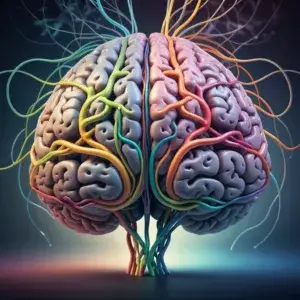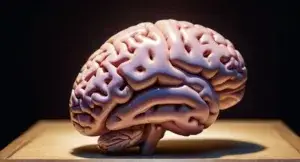Table of Contents
In today’s fast-paced world, where stress and mental fatigue are all too common, discovering simple yet effective techniques to improve brain function and mental clarity is critical. Deep breathing for brain health is an excellent skill, but it is often undervalued. This ancient technique, based on mindfulness and meditation, has the potential to greatly improve your brain health and mental clarity. In this post, we will look at the several benefits of deep breathing, as well as different strategies and apps to aid you along the way.
The Science of Deep Breathing for Brain Health
Deep breathing, also known as diaphragmatic or abdominal breathing, entails taking slow, deep breaths that fill your lungs to their maximum capacity. This procedure enhances oxygen intake and facilitates gas exchange in the bloodstream. This is how it works.
Oxygen Supply: Deep breathing improves oxygen delivery to the brain, which is required for proper brain function. Oxygen fuels brain cells, allowing them to carry out complicated tasks efficiently.
CO2 Removal: It helps your body eliminate carbon dioxide, a waste product. A proper balance of oxygen and carbon dioxide is essential for keeping your blood pH stable and preventing brain fog.
Parasympathetic Activation: Deep breathing stimulates the parasympathetic nerve system, popularly known as the “rest and digest” system. This lowers stress hormones and creates a sense of peace and relaxation.
Deep Breathing for Brain Health and Mental Clarity.
1. Decreased stress and anxiety.
Stress and worry can hinder your cognitive performance. Research has proven that deep breathing can reduce cortisol, the stress hormone, and increase relaxation. When you’re calm, your mind is clearer, and you can concentrate more on the subject at hand.
2. Improved concentration and focus.
Deep breathing increases oxygen flow to the brain, which improves concentration and focus. More oxygen improves brain function, which leads to greater cognitive functions like memory, attention, and decision-making.
3. Improved memory retention.
Adequate oxygen flow is essential for the hippocampus, the brain area responsible for memory development and retention. Deep breathing ensures that your hippocampus gets the oxygen it needs to function properly, which improves your memory.
4. Improved regulation of emotions
Deep breathing relaxes the neurological system, helping to control emotions. This enables you to regulate stress and emotional responses more efficiently, resulting in increased mental clarity and stability.
5. Increased creativity.
When your mind is clear of stress and noise, creativity flows more easily. Deep breathing can help you unlock your creative potential by boosting mental clarity and focus.
Deep Breathing for Brain Health Techniques
1. Box Breathing.
Box breathing, also known as four-square breathing, is the process of inhaling, holding, expelling, and holding the breath for four counts each. This technique helps to balance your nervous system and increase concentration.
- Inhale deeply through your nose for 4 seconds.
- Hold your breath for four seconds.
- Slowly exhale through your mouth for four seconds.
- Hold your breath for another 4 seconds.
- Repeat several rounds.
2. 4-7-8 Breathing.
Focusing on longer exhales will help you relax and lessen anxiety.
- Inhale deeply through your nose for 4 seconds.
- Hold your breath for seven seconds.
- Slowly exhale through your mouth for 8 seconds.
- Repeat several rounds.
3. Alternate nostril breathing.
Yoga frequently uses this technique to balance the left and right hemispheres of the brain and improve mental clarity.
- Sit comfortably and seal your right nostril with your thumb.
- Inhale deeply via your left nostril.
- Close your left nostril with your ring finger, then open your right nose.
- Slowly exhale through your right nostril.
- Inhale deeply via your right nostril.
- Close your right nostril and breathe out through your left.
- Repeat several rounds.
Apps for guiding your Breathing Practice
To assist you in incorporating these breathing techniques into your regular practice, consider using the following apps:
1. Calm
Calm provides guided breathing exercises and meditation sessions to help relieve stress and increase mental clarity.
2. Headspace.
Headspace offers guided breathing exercises and mindfulness practices that improve attention and reduce anxiety.
3. Breathe and Relax.
The Department of Defense developed this program, which offers detailed instructions and visual aids for deep breathing exercises.
4. Prana Breath.
Prana Breath focuses on a variety of breathing techniques, including those stated above, to help you improve your breathing habits and mental health.
Deep breathing is a simple but effective activity that can greatly improve mental clarity and brain function. Deep breathing for brain health can help you attain peak cognitive function by lowering stress, increasing concentration, and promoting emotional stability. Incorporate these strategies into your daily routine, and use the recommended applications to assist you. Deep breathing has substantial benefits for brain function and overall well-being.
Begin your journey to better brain health today by including deep breathing exercises in your daily regimen. Subscribe to our newsletter to receive additional suggestions on improving your mental clarity and cognitive performance, as well as the most recent brain health research.
Please share your deep breathing for brain health experiences in the comments section below or on our Facebook page. Your thoughts may inspire others on their path to better brain health.
References
- American Institute of Stress: Deep Breathing for Brain Health and Relaxation
- National Center for Biotechnology Information (NCBI): Effect of diaphragmatic breathing on attention, negative affect, and stress in healthy adults
- Healthline: 4-7-8 Breathing: How It Works, How to Do It, and More
- Mindful: How to Practice Box Breathing
- Verywell Mind: How to Use Breathing Exercises for Anxiety
- Psychology Today: The Neurobiology of Grace Under Pressure
- Headspace: Deep Breathing for Brain Health and relieving anxiety
- Calm: Deep Breathing Techniques
- Prana Breath: Dynamic breathing and meditation techniques
- Harvard Health Publishing: Relaxation techniques: Breath control helps quell errant stress response







